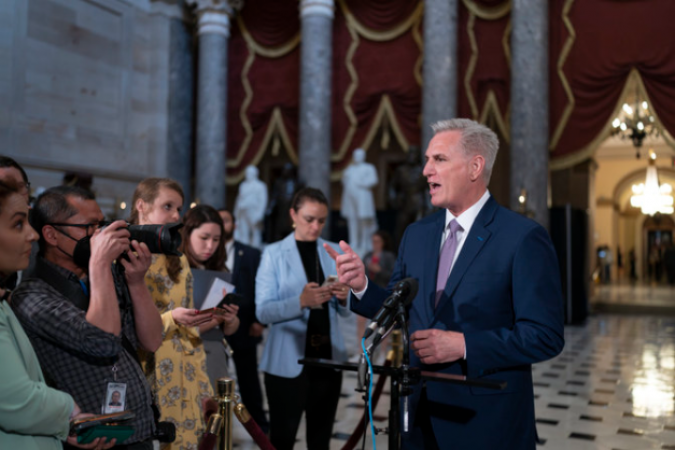
Washington: A bill that includes significant spending cuts over the next ten years and would raise the government's $31.4 trillion debt ceiling narrowly passed the US House of Representatives on Wednesday.
The bill isn't anticipated to pass the Senate, and if it did, President Joe Biden would veto it. Nevertheless, the largely partisan vote of 217 to 215 in favour of the bill gives Republican House Speaker Kevin McCarthy a victory on a topic that alarmed investors and the stock market.
As the White House and congressional Democrats insist on an increase in the debt ceiling with no conditions attached, McCarthy is now attempting to seduce Biden into talks about spending reductions.
Also Read: States formally announce assistance for Sudanese evacuees
If Congress does not take action, the US Treasury Department could run out of ways to pay its bills in a matter of weeks, and the financial markets are already giving warning signs. A 2011 standoff resulted in the government's credit rating being lowered, which increased borrowing costs and hurt investments.
Just after the vote, McCarthy, who had won, told reporters, "We've done our job." "The debt ceiling was raised by the Republicans. No, you haven't. McCarthy continued, mentioning Biden and leading Senate Democrat Chuck Schumer. "Neither has Schumer," he said.
To pass the bill, McCarthy overcame severe divisions among House Republicans. The much more difficult task will be trying to negotiate a compromise with Democrats without alienating some of his most ardent supporters.
McCarthy urged Biden to start talks on a bill to raise the debt ceiling and cut spending as well as for the Senate to either pass the House bill or its own.
The House proposal would extend Washington's borrowing authority until March 31 or by $1.5 trillion, whichever comes first. This would likely result in additional negotiations during the 2024 presidential election.
The bill would reduce spending to levels that are consistent with 2022 and then cap growth at 1% annually. It would also eliminate some tax breaks for renewable energy sources and tighten the work requirements for some anti-poverty programmes.
Also Read: Sri Lanka to discuss debt restructuring with India and more: Wickremesinghe
Karine Jean-Pierre, the press secretary for the White House, claimed that Biden would not consent to such cuts.
According to a statement she made, "President Biden will never force middle class and working families to bear the burden of tax cuts for the wealthiest, as this bill does." "The President has made it clear that there is no chance of this bill becoming law."
According to Schumer, the Republican proposal "only brings us dangerously closer" to a historic US debt default, which would roil markets and economies around the world, and that the House bill is "dead on arrival" in the Senate.
With 51 votes, Democrats are in charge of the Senate.
In an interview earlier in the day, House Majority Leader Steve Scalize predicted that the Republican debt limit bill's passage would alter the "entire dynamic" and put pressure on Democrats to negotiate.
Republicans were quick to applaud McCarthy's victory, which was close to being called.
The debt ceiling vote, according to Representative Michael McCaul, "now demonstrates that we can govern even with a five member majority, and there's been so much criticism that we couldn't do this." "We've shown the nation that we can rule,"
Republicans have portrayed Democrats as reckless spenders of tax dollars throughout the bill's debate, which they claim has put the nation's debt in danger.
Democrats, on the other hand, lamented the significant budget cuts the proposal would entail for a variety of programmes, including law enforcement and airport security operations, as well as Head Start education for young children and health care for the underprivileged.
The bill, according to the Department of Transportation, would result in 7,500 fewer days for rail safety inspections and the closure of 375 air traffic control towers across the nation that are operated under contract and staffed by the federal government.
To keep the legislation alive, McCarthy was forced to give in to some of his members' demands early on Wednesday morning.
The 2022 Inflation Reduction Act was amended overnight to remove a clause that would have terminated a tax credit for biofuels as part of Biden's climate change initiatives.
Republicans also accelerated some new, stricter work requirements for receiving Medicaid health care benefits for the poor, caving in to the far-right wing of the party and upsetting Democrats.
"Republicans' massive tax cuts for the wealthy have cost taxpayers over $10 trillion over the last two decades, and now they want America's workers and families to pay the price," said Representative Richard Neal, the top Democrat on the House Ways and Means Committee.
Also Read: Slack has unveiled Canvas, an in-app feature same as Google Docs
As it did three times under Donald Trump, the Republican who succeeded Biden as president, the White House has urged Congress to raise the debt ceiling without restrictions.
The amount of time left for action by lawmakers is unknown. The "x-date" when the Treasury Department wouldn't be able to cover all of its expenses could occur as early as June or later into the summer.